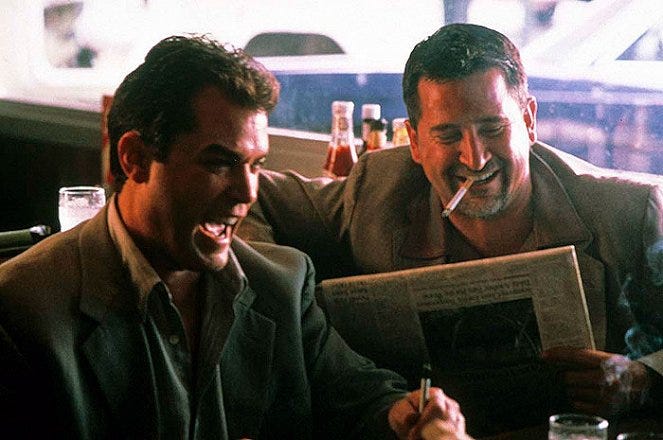Ray Liotta + Crime Movie should be a 100% winning formula, right?
Well...yes and no. Putting Liotta in your crime movie automatically elevates it, definitely. Phoenix (1998) is a great case in point.
Liotta plays a police officer with a compulsive gambling problem. He's also a lousy gambler, who loses any bet beyond $50. To make things worse, he has a questionable code of never welshing on a bet, which means once he gets into trouble with his murderous bookie, things go bad.
Liotta is part of a four man detective team, a sort of low-rent version of Mulholland Falls. Substituting Liotta for Nick Nolte is an even trade, but instead of Micheal Madsen, Chazz Palminteri, and Chris Penn, you get Anthony LaPaglia, Daniel Baldwin, and Jeremy Piven. Definitely the 90s 'B' Team.
Based on their behavior in the movie, you wonder exactly what kind of cops these guys are. They show up to crime scenes, crack jokes, then leave. You don't see them, not once, pursuing leads or doing any work whatsoever to solve a case. LaPaglia is an ugly psychopath who does enforcement on the side for a loan shark (well played by a young Giancarlo Esposito) and screws Piven's wife. Baldwin's main role in the movie is yell and swear and exhibit his trademark coked-out flop sweat.
LaPaglia offers to kill Liotta's bookie or suggests they rob a whorehouse, but Liotta's weird code rebuffs these ideas. Instead, they decide to rob Esposito. Of course, that goes wrong and the movie staggers to a bloody resolution involving double-crosses and violent redemption.
Phoenix is not a great script. The movie seriously meanders. And by meander, I mean it wanders from one story line to another, rarely keeping a focus on one main thread. Liotta has a romantic subplot with Anjelica Huston that seems tacked on. He gets easily beat up by the bookie's henchmen but also terrorizes another one. A subplot involving one team member betraying the others happens so that the movie can deliver the ending it wants.
There are several obvious Tarantino-esque conversations, sprinkled with pop culture and literary references. The villains in this movie are unusually literate. (Tom Noonan as the bookie is, as always, delightful). Most screenwriters are not Quentin Tarantino and the 90s are littered with failed attempts like this to ape his mojo.
Also, for a city in the desert, it sure rains a lot in Phoenix.
The overall tone of the movie is either a problem or its greatest strength, depending on your perspective. A more traditional Noir narrative might have Liotta's character's gambling problem leading them into a downward spiral of doom and death. A tighter, darker story that placed a doomed protagonist at its heart might have been a superior crime movie.
But in Phoenix, Liotta's character is oddly likable and decent. He brings home a young (and sexually aggressive) Brittany Murphy, but doesn't have sex with her. Instead, he brings her home to her mother - Huston – and later apologizes for involving her with his gambling. He tries to keep the heist non-violent (but fails). He helps out his landlord who is in trouble with the same bookie he owes money to. He scolds LaPaglia for sleeping with a partner's wife. Throughout the movie, he is always trying to do the right thing.
The ending of the movie, where Liotta delivers justice to deserving malefactors, is noble and heroic, if also tragic. How you relate to his character will probably determine whether you like the tone of the movie or not. Ultimately, the star power of Ray Liotta was enough for me to enjoy it, even though I clearly thought it could have been a better movie.
So based on that lukewarm endorsement and my love for Ray Liotta, I will make the effort in coming months to spotlight his better crime movies. Any suggestions are welcome.




